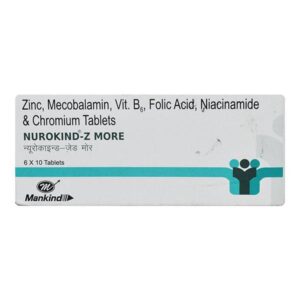FOLIC ACID + BIOTIN + MECOBALAMIN
Folic Acid: Folic acid, also known as folate or vitamin B9, is a synthetic form of a water-soluble vitamin that plays a crucial role in various bodily functions. It is primarily used as a dietary supplement to meet the increased demand for folate during periods of rapid growth, such as pregnancy, infancy, and adolescence. Folic acid deficiency can lead to anemia and neural tube defects in newborns.
The mechanism of action of folic acid involves its conversion into its active form, tetrahydrofolate (THF), in the body. THF participates in multiple biochemical reactions, including the synthesis of DNA, RNA, and proteins. It is essential for cell division, growth, and repair.
For adults, the recommended daily dose of folic acid is 400 micrograms (mcg). Pregnant women or those planning to conceive are advised to take a higher dose of 600 to 800 mcg per day to prevent neural tube defects in their developing fetus. Breastfeeding women should continue taking 500 mcg daily.
Folic acid is generally safe when taken within the recommended dosage. However, high doses (above 1,000 mcg/day) may cause digestive symptoms like nausea, bloating, and diarrhea. It may also mask the symptoms of vitamin B12 deficiency, which can lead to nerve damage if left untreated. Individuals with vitamin B12 deficiency should take folic acid under medical supervision as it can exacerbate the deficiency.
In rare cases, hypersensitivity reactions or allergic responses may occur. Symptoms of an allergic reaction include rash, itching, swelling, dizziness, and difficulty breathing. If any severe side effects occur, it is necessary to consult a healthcare professional promptly.
It is important to note that folic acid supplementation should not replace a healthy diet rich in natural sources of folate, such as leafy green vegetables, legumes, fruits, and fortified grains. Additionally, individuals with certain medical conditions or on specific medications should consult their healthcare provider before starting folic acid supplementation.
Biotin: Biotin, also known as vitamin B7 or vitamin H, is a water-soluble vitamin that plays a crucial role in various metabolic processes in the body. It is essential for the metabolism of carbohydrates, fats, and proteins, and is involved in the synthesis of fatty acids, glucose, and certain amino acids.
Biotin is commonly used as a dietary supplement to address biotin deficiency or in conditions where increased biotin requirements are necessary. It is also used for its potential benefits in promoting hair, skin, and nail health.
The mechanism of action of biotin is mainly related to its role as a coenzyme. Biotin serves as a cofactor for various enzymes involved in important metabolic pathways. It acts as a carrier of activated carbon dioxide and transfers it to specific enzymes, allowing for important chemical reactions to occur.
The commonly recommended dose of biotin for adults is 30-100 micrograms per day. However, higher doses may be required in certain conditions such as biotin deficiency, which can be caused by certain genetic disorders, malabsorption issues, or prolonged antibiotic use.
Biotin is generally considered safe when used appropriately. It is well-tolerated and rarely associated with any significant side effects. However, in rare cases, some individuals may experience allergic reactions such as itching, redness, or hives. Additionally, high doses of biotin may interfere with certain laboratory tests, leading to inaccurate results, particularly in thyroid function tests.
It is important to note that biotin supplements are generally regarded as safe, but it is always advisable to consult a healthcare professional before starting any new supplement regimen, especially if you have any underlying health conditions or are taking other medications.
Mecobalamin: Mecobalamin, also known as methylcobalamin, is a form of vitamin B12. It is used as a nutritional supplement and as a treatment for certain medical conditions related to vitamin B12 deficiency. Mecobalamin is usually administered orally or via injection.
The primary function of mecobalamin is to facilitate the production of red blood cells and maintain the health of nerve cells. It acts as a coenzyme in various metabolic reactions, playing a crucial role in the synthesis of DNA and the formation of myelin, a protective covering around nerve cells.
The dosage of mecobalamin varies depending on the patient’s age, underlying condition, and the severity of the deficiency. An average oral dose for adults is usually in the range of 500-1500 micrograms per day. Injections of mecobalamin can be given at a dose of 1000 micrograms per day, with the frequency and duration determined by the prescribing healthcare professional.
Side effects of mecobalamin are usually rare, but some individuals may experience mild side effects such as gastrointestinal disturbances (nausea, vomiting, diarrhea), headache, or allergic reactions like itching or rash. In rare cases, high doses of mecobalamin may cause hypokalemia (low potassium levels), which can result in abnormal heart rhythms or muscle weakness.
Mecobalamin is generally considered safe and well-tolerated when used as directed. However, it is important to consult with a healthcare professional before initiating mecobalamin supplementation, especially if you have any underlying medical conditions, are taking other medications, or are pregnant or breastfeeding.

